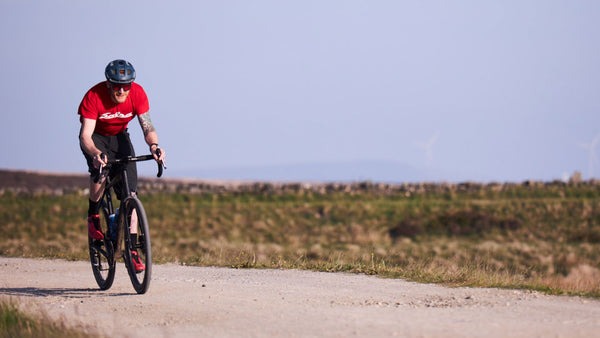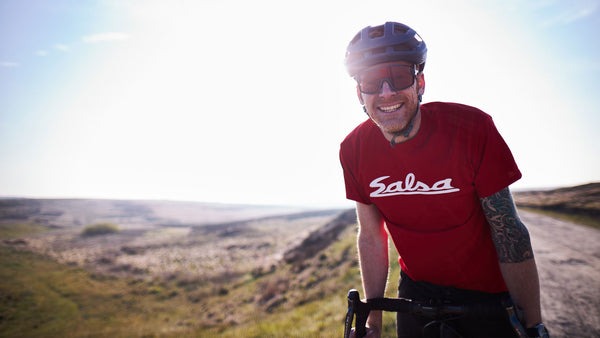
STEVE BATE
CURRENT LOCATION:
Yorkshire, England
CYCLING DISCIPLINE(S):
I race on the track and road, but ride MTB, gravel, and fat bikes
IN 2011, YOU WERE DIAGNOSED WITH RETINITIS PIGMENTOSA, A DEGENERATIVE CONDITION THAT HAS LEFT YOU VISUALLY IMPAIRED. HOW HAS THAT DIAGNOSIS SHAPED THE WAY YOU SET GOALS AND FACE OBSTACLES?
It gave me the reality check that nothing is a given in this life. I talk about “doing things” less these days; if I want to do something, I find a way to make it happen. At some point I’ll go blind, so until that day I have to make the most of the sight I have. There is no point getting down about stuff like this — it’s happened and I can’t change it, but what I can do is carry on living the life I wanted to live. It maybe not how would have done things if I was fully sighted, but I can normally find a way to make it happen if I’m passionate about achieving something. I’m fortunate to be surrounded by great people who want to help me do crazy adventures.
IN 2013, YOU BECAME THE FIRST VISUALLY IMPAIRED PERSON TO SOLO CLIMB EL CAPITAN. WHAT HAS THAT ACHIEVEMENT MEANT TO YOU?
El Cap was the first thing I really put my mind to. It was a goal I set for myself after my diagnosis, to prove I could still achieve my potential doing adventurous stuff. I didn’t even know I was going to be the first visually impaired dude to climb it, I just wanted to prove something to myself. The lessons I learnt from that climb have paved the way in which I have approached life since and will continue to do so. I’m super proud of that achievement. It still stands above everything else I have achieved to this day.
YOU WERE AN ACCOMPLISHED CLIMBER AND OUTDOOR INSTRUCTOR BEFORE GETTING INTO CYCLING. WHAT MADE YOU DECIDE TO BRANCH OUT? DID YOU HAVE ANY CYCLING EXPERIENCES EARLIER IN YOUR LIFE?
Getting my eye diagnosis meant I qualified to race on the back of a tandem, and to try to make selection for the Rio 2016 Games (I say that like it was straightforward, but I’m sure you get the idea). In 2013 I had just come back from El Cap and I guess I was up for a seemingly impossible challenge. The attraction was having the full support of coaches, physios, nutritionists, etc. to see how good I could get if I gave it 100%, just as I had climbing El Cap. It could have been any sport, to be honest, but cycling was the first opportunity that came along. I raced a couple of mountain bike races growing up in New Zealand, but I was rubbish. I was never very good at sports at school and never played in the top teams. But I’ve always had an interest in what I could achieve with my body. It’s the greatest asset we are given, and it’s free. Our bodies are pretty amazing when you think about it, and I’m still learning what mine can do.

HOW DO THE PHYSICAL AND MENTAL CHALLENGES OF CLIMBING COMPARE TO THOSE OF CYCLING?
Climbing is amazing at teaching you to get comfortable when you're uncomfortable. It makes you strong in the mind and body. I don’t think I could have achieved what I have in cycling without the strong base of mental resilience that climbing has given me. When I have big race on the bike and start to feel the pressure, it’s easy to laugh that off thinking, “well I’m not going to die doing this, it’s just a bike race at the end of the day.” They are pretty different disciplines, so it’s hard to compare them as I was never a professional climber. I think when you are paid to do something it becomes a different beast to just having fun with your mates.
YOU'VE GONE ON TO WIN MULTIPLE MEDALS IN THE PARALYMPIC GAMES (TWO GOLDS AND A BRONZE IN RIO DE JANEIRO IN 2016, AND A SILVER IN TOKYO IN 2021). WHAT WERE SOME OF THE HIGHLIGHTS FROM THOSE EXPERIENCES?
It’s always the people from the journey. My teammates, who had me laughing until my ribs hurt when the results weren’t great but kept me grounded and honest when the wins came; the coaches and support staff I’ve been fortunate to work with; and the random acts of kindness from complete strangers out on the road. The best thing about winning medals isn’t standing on the podium and getting all the praise, it’s doing a job for all the people who work just as hard as you behind the scenes. Being able to put that medal in someone’s hand and watching their reaction is a massive privilege. It’s the stuff dreams are made of to hold a Paralympic medal, and I want to give that moment to as many people as possible through what I’ve achieved. That feeling never gets old.
WHAT IS THE RELATIONSHIP LIKE BETWEEN A VISUALLY IMPAIRED CYCLIST AND A SIGHTED CO-PILOT?
I guess it depends on the people. Adam [Duggleby] and I get on really well. We are both trying to achieve the same thing, and when your goals are aligned it's a pretty special environment to be in — plus we’ve had a good laugh along the way. We manage to stay pretty relaxed around racing, which I guess helps. But I have heard there are pilots and stokers who can’t even speak to each other, which I find strange when you are on a bike together. Thankfully, we’ve never been like that, and I can’t thank Adam enough. There’s no way I would have achieved what I have in the sport without him. I’m lucky to ride with a guy that’s truly world-class.
IN 2022, YOU'LL BE ATTEMPTING TO SET A NEW SPEED RECORD FOR RIDING THE LENGTH OF AFRICA. WHAT INSPIRED YOU TO WANT TO DO THIS? HOW ARE YOU PREPARING FOR IT?
Unfortunately, I’ve had to push this back a year, but I’m still really stoked to get to the start line in 2023. I’m a massive fan of big adventures, it’s where I learn the most about myself as a person. I don’t feel the need to win more medals and break more records, however I do have to keep stretching myself and seeing what is possible for me. I was really inspired by Mark Beaumont's ride back in 2015 and thought it would be a great adventure. I love combining skill sets to achieve a goal, so bringing elite cycling and adventuring together is super exciting, I just hope COVID chills out so I can make it happen. There are no secrets out there for riding these sorts of miles day in day out. It’s just about spending time on the bike for long periods and letting your body adapt to that process. I’m a big fan of keeping things simple when it comes to training. I know what works for me, so I just need to go through the motions, but I know for a fact this ride is 90% mental and 10% physical, so there is some work to be done upstairs as well :).
IT SEEMS LIKE YOU PROBABLY SPEND A LOT OF TIME TRAINING AND PREPARING FOR THESE MONUMENTAL FEATS, BUT WHAT DO YOU DO TO RELAX?
Eat pizza and drink beer! Haha. I like hanging out with my wife, Caroline and our dog, Murphy, whether it’s on the beach or in the mountains. We have a van and try and make the most of van trips when we can. I still really enjoy riding my bike with friends and I’ve managed to keep a healthy balance of riding for fun and for work. I think the gravel, MTB, and fat bike help with that. It’s good to mix up your riding — I think it keep things more interesting.
ARE THERE ANY ACHIEVEMENTS YOU'D LIKE US TO MENTION (PERSONAL, PROFESSIONAL…ANYTHING YOU'RE PROUD OF)?
I’m proud of everything I’ve achieved, but I have to keep that in perspective. I’m not saving lives or the planet. People who invest their lives in that are my heroes, and we should sing their praises, not some blind guy who rides around in circles. I’m incredibly fortunate to work with some amazing brands which I’m also super proud to be involved with.

ARE THERE ANY ORGANIZATIONS THAT YOU WOULD LIKE TO SHOUT OUT?
There are too many to mention, from eye research to environmental charities. But to all those making a positive impact in the world, I salute you. Thanks for all that you do, and keep fighting the good fight.
